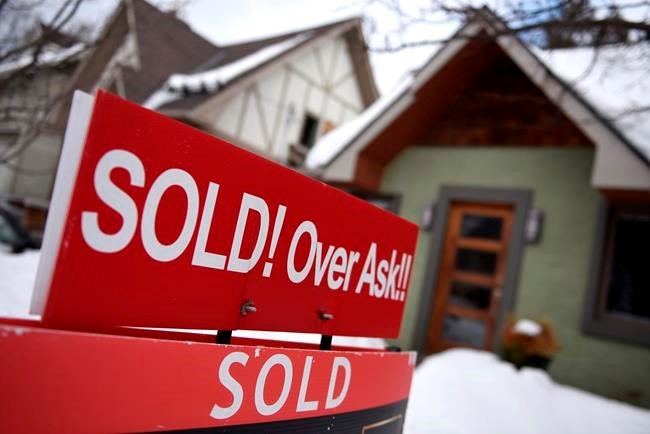OTTAWA — The federal Liberals are being pressed to use this week's federal budget to make a significant down payment to help lower the cost of housing.
Rising housing costs was a key issue for all parties during the last federal election and prices have continued their meteoric rise in the months since.
The latest figures from the Canadian Real Estate Association showed the average national home price was a record $816,720 in February, up 20.6 per cent from the same month one year earlier, and heavily influenced by sales in and around Vancouver and Toronto.
Statistics Canada reported last month that rent prices were up 4.2 per cent year-over-year in February.
The pandemic-induced rise in prices — fuelled by rock-bottom interest rates, demand for larger homes and supply-chain bottlenecks — has shown how dire Canada's housing needs are, said Joanne Vanderheyden, president of the Federation of Canadian Municipalities.
She said delaying spending because of competing demands on the public purse is not an option given the situation.
Any delays would slow the country's economic recovery and further strain already financially vulnerable households, Vanderheyden said.
"The time for the federal government to be bold on housing and fix this crisis for all is right now," said Vanderheyden, who is also the mayor of the municipality of Strathroy-Caradoc in southwestern Ontario.
"We don't want to wait another budget season. We can't wait, we just can't. We need to tackle this issue right now in concrete ways."
She said the government can rely on existing programs that have proven successful during the pandemic to boost the supply of housing such as the popular and successful rapid-housing program.
That program gives cities money for quick construction of modular homes or to buy buildings that can be turned into affordable housing units.
The Liberals promised a reboot of the popular program as part of a political pact with the New Democrats made last month. NDP Leader Jagmeet Singh said Tuesday that he expects to see something in the budget to that end.
Housing advocates are hoping to see at least $1 billion annually for the rapid-housing program, and potentially more for another measure of keen interest to cities.
In last year's election campaign, the Liberals promised $4 billion for a "housing accelerator fund" to build 100,000 new "middle-class" homes by 2025. Some funding promised to cities in the plan would be available on a use-it-or-lose-it basis.
The Liberals envision it as a program to help cities pay for more planners to reduce construction approval times or quickly redo zoning rules, or help offset the cost of buying land for new projects.
Cities have been quite keen on the getting the fund up and running since the promise was first made in August. The government issued a call for proposals on the plan earlier this year and it was mentioned in the deal between the Liberals and NDP in March.
That gives city leaders hope that the money will materialize in the budget on Thursday.
Housing Minister Ahmed Hussen told the House of Commons on Monday that the government intends to move ahead on measures to increase the supply of homes.
The plan with the NDP also calls for a one-time, $500 top-up to the Canada Housing Benefit to help low-income renters offset cost increases.
Rebekah Young, director of fiscal and provincial economics at Scotiabank Canada, wrote in a pre-budget analysis that measures to boost supply should help address some price pressures, but that won't happen quickly enough to "tamp down" short-term inflation on housing costs.
She warned that some measures could actually fuel housing demand on the margins, and add heat to price pressures, including the government's promise to double the homebuyers' tax credit and reduce CMHC mortgage insurance costs by 25 per cent.
David Macdonald, a senior economist with the Canadian Centre for Policy Alternatives, said the federal government can help cool housing prices by moving ahead with an anti-flipping tax or requiring larger down payments to get a mortgage for an income property.
"One of the big drivers of inflation is high house prices. They've gone through the roof in the last year," he said. "That is absolutely something that the federal government could play a key role in capping and reducing."
This report by The Canadian Press was first published April 5 2022.
Jordan Press, The Canadian Press



